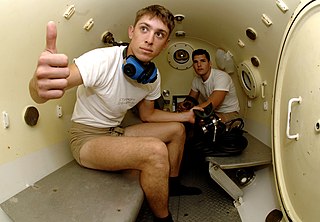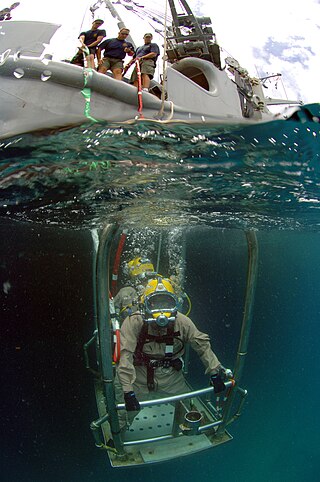Related Research Articles
A divemaster (DM) is a role that includes organising and leading recreational dives, particularly in a professional capacity, and is a qualification used in many parts of the world in recreational scuba diving for a diver who has supervisory responsibility for a group of divers and as a dive guide. As well as being a generic term, 'Divemaster' is the title of the first professional rating of many training agencies, such as PADI, SSI, SDI, NASE, except NAUI, which rates a NAUI Divemaster under a NAUI Instructor but above a NAUI Assistant Instructor. The divemaster certification is generally equivalent to the requirements of ISO 24801-3 Dive Leader.

Dynamic positioning (DP) is a computer-controlled system to automatically maintain a vessel's position and heading by using its own propellers and thrusters. Position reference sensors, combined with wind sensors, motion sensors and gyrocompasses, provide information to the computer pertaining to the vessel's position and the magnitude and direction of environmental forces affecting its position. Examples of vessel types that employ DP include ships and semi-submersible mobile offshore drilling units (MODU), oceanographic research vessels, cable layer ships and cruise ships.

Professional diving is underwater diving where the divers are paid for their work. Occupational diving has a similar meaning and applications. The procedures are often regulated by legislation and codes of practice as it is an inherently hazardous occupation and the diver works as a member of a team. Due to the dangerous nature of some professional diving operations, specialized equipment such as an on-site hyperbaric chamber and diver-to-surface communication system is often required by law, and the mode of diving for some applications may be regulated.

Commercial diving may be considered an application of professional diving where the diver engages in underwater work for industrial, construction, engineering, maintenance or other commercial purposes which are similar to work done out of the water, and where the diving is usually secondary to the work.

Diving medicine, also called undersea and hyperbaric medicine (UHB), is the diagnosis, treatment and prevention of conditions caused by humans entering the undersea environment. It includes the effects on the body of pressure on gases, the diagnosis and treatment of conditions caused by marine hazards and how aspects of a diver's fitness to dive affect the diver's safety. Diving medical practitioners are also expected to be competent in the examination of divers and potential divers to determine fitness to dive.

An umbilical cable or umbilical is a cable and/or hose that supplies required consumables to an apparatus, like a rocket, or to a person, such as a diver or astronaut. It is named by analogy with an umbilical cord. An umbilical can, for example, supply air and power to a pressure suit or hydraulic power, electrical power and fiber optics to subsea equipment and divers.

A dive log is a record of the diving history of an underwater diver. The log may either be in a book, locally hosted software, or web based. The log serves purposes both related to safety and personal records. Information in a log may contain the date, time and location, the profile of the dive, equipment used, air usage, above and below water conditions, including temperature, current, wind and waves, general comments, and verification by the buddy, instructor or supervisor.

A bailout bottle (BoB) or, more formally, bailout cylinder is a scuba cylinder carried by an underwater diver for use as an emergency supply of breathing gas in the event of a primary gas supply failure. A bailout cylinder may be carried by a scuba diver in addition to the primary scuba set, or by a surface supplied diver using either free-flow or demand systems. The bailout gas is not intended for use during the dive except in an emergency, and would be considered a fully redundant breathing gas supply if used correctly. The term may refer to just the cylinder, or the bailout set or emergency gas supply (EGS), which is the cylinder with the gas delivery system attached. The bailout set or bailout system is the combination of the emergency gas cylinder with the gas delivery system to the diver, which includes a diving regulator with either a demand valve, a bailout block, or a bailout valve (BOV).

Commercial offshore diving, sometimes shortened to just offshore diving, generally refers to the branch of commercial diving, with divers working in support of the exploration and production sector of the oil and gas industry in places such as the Gulf of Mexico in the United States, the North Sea in the United Kingdom and Norway, and along the coast of Brazil. The work in this area of the industry includes maintenance of oil platforms and the building of underwater structures. In this context "offshore" implies that the diving work is done outside of national boundaries. Technically it also refers to any diving done in the international offshore waters outside of the territorial waters of a state, where national legislation does not apply. Most commercial offshore diving is in the Exclusive Economic Zone of a state, and much of it is outside the territorial waters. Offshore diving beyond the EEZ does also occur, and is often for scientific purposes.

The diving supervisor is the professional diving team member who is directly responsible for the diving operation's safety and the management of any incidents or accidents that may occur during the operation; the supervisor is required to be available at the control point of the diving operation for the diving operation's duration, and to manage the planned dive and any contingencies that may occur. Details of competence, requirements, qualifications, registration and formal appointment differ depending on jurisdiction and relevant codes of practice. Diving supervisors are used in commercial diving, military diving, public safety diving and scientific diving operations.
The Australian Diver Accreditation Scheme (ADAS) is an international commercial and occupational diver certification scheme. It has mutual recognition arrangements with other equivalent national schemes. ADAS qualifications have international recognition.

Diver training is the set of processes through which a person learns the necessary and desirable skills to safely dive underwater within the scope of the diver training standard relevant to the specific training programme. Most diver training follows procedures and schedules laid down in the associated training standard, in a formal training programme, and includes relevant foundational knowledge of the underlying theory, including some basic physics, physiology and environmental information, practical skills training in the selection and safe use of the associated equipment in the specified underwater environment, and assessment of the required skills and knowledge deemed necessary by the certification agency to allow the newly certified diver to dive within the specified range of conditions at an acceptable level of risk. Recognition of prior learning is allowed in some training standards.
The International Diving Regulators and Certifiers Forum (IDRCF) is an organisation representing a group of national regulatory and certifying bodies for occupational diving, and other interested and affected parties. The IDRCF confirmed its principles and purpose at their meeting in London in September 2009. The statement of principles and purpose states “The forum has agreed to work together towards mutual recognition to identify and implement best practice in diver training and assessment with the objective of harmonising cross-border diver training outside Europe.”

Surface supplied diving skills are the skills and procedures required for the safe operation and use of surface-supplied diving equipment. Besides these skills, which may be categorised as standard operating procedures, emergency procedures and rescue procedures, there are the actual working skills required to do the job, and the procedures for safe operation of the work equipment other than diving equipment that may be needed.
The Diving Medical Advisory Council (DMAC) is an independent organisation of diving medical specialists, mostly from across Northern Europe which exists to provide expert advice about medical and some safety aspects of commercial diving. The advice is published in the form of guidance documents, which are made available for download.

The following outline is provided as an overview of and topical guide to underwater diving:
The operations manual is the documentation by which an organisation provides guidance for members and employees to perform their functions correctly and reasonably efficiently. It documents the approved standard procedures for performing operations safely to produce goods and provide services. Compliance with the operations manual will generally be considered as activity approved by the persons legally responsible for the organisation.
Diving regulations are the stipulations of the delegated legislation regarding the practice of underwater diving. They apply within the national territory and territorial waters of a country. In most cases they apply to occupational diving, but in a few cases also to recreational diving. There are exemptions for recreational diving in some cases where it is recognised as a self-regulated industry. Offshore diving is generally outside the scope of diving regulations, and tends to be self-regulated through voluntary membership of industry organisations.

A diving team is a group of people who work together to conduct a diving operation. A characteristic of professional diving is the specification for minimum personnel for the diving support team. This typically specifies the minimum number of support team members and their appointed responsibilities in the team based on the circumstances and mode of diving, and the minimum qualifications for specified members of the diving support team. The minimum team requirements may be specified by regulation or code of practice. Some specific appointments within a professional dive team have defined competences and registration may be required.
Association of Diving Contractors International, abbreviated as ADC or ADCI, is a non-profit organization devoted to promoting standards and issuing certifications for commercial diving skills.
References
- ↑ Staff. "Member Directory". International Marine Contractors Association. Retrieved 10 July 2023.
- ↑ Staff. "IMCA Regions". About IMCA. International Marine Contractors Association. Retrieved 7 July 2016.
- ↑ "Non-Governmental international Organizations which have been granted consultative status with IMO" . Retrieved 18 August 2023.
- ↑ "International Marine Contractors Association publishes 2003 safety statistics". South Pacific Underwater Medicine Society (SPUMS) Journal. 35 (2). 2005.
- ↑ Staff. "Safety, Environment & Legislation". International Marine Contractors Association. Retrieved 7 July 2016.
- ↑ "Safety Flashes". www.imca-int.com. Retrieved 10 August 2024.
- 1 2 3 4 5 6 Staff. "Publications catalogue" (PDF). IMCA. Retrieved 7 July 2016.
- ↑ Staff (February 2014). "IMCA International Code of Practice for Offshore Diving" (PDF). IMCA D 014 Rev. 2. London: International Marine Contractor's Association. Retrieved 22 July 2016.
- ↑ Staff (2002). Williams, Paul (ed.). The Diving Supervisor's Manual (IMCA D 022 May 2000, incorporating the May 2002 erratum ed.). London, UK: International Marine Contractors' Association. ISBN 1-903513-00-6.
- ↑ Staff (July 2014). "Section 5 - Diving Bell: 5.23 - Onboard gas, and 5.24 - Onboard oxygen". IMCA D024 Rev 2 - Part 2 DESIGN for Saturation (Bell) Diving Systems (PDF) (Revision 2 ed.). London,UK: International Marine Contractors Association. pp. 4 of 10. Retrieved 30 January 2016.
- ↑ "Training & Certification". Diving. International Marine Contractors Association. Retrieved 7 July 2016.
- ↑ "Diving Personnel Certification". IMCA. Retrieved 25 September 2024.
- 1 2 Staff. "IMCA History". International Marine Contractors Association. Retrieved 10 July 2023.